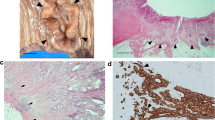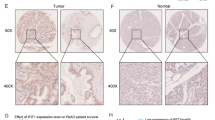Abstract
The interaction of the adenomatous polyposis coli (APC) tumor-suppressor protein and the intracellular cell-adhesion protein β-catenin is crucial for the development of colorectal tumors. Since functional nuclear complexes of β-catenin with transcription factors have been identified recently, the knowledge of level and distribution of β-catenin in sporadic colorectal tumors will give important insights into the intracellular mechanism of sporadic colorectal tumor initiation and progression. In contrast to the familiar adenomatous polyposis syndrome and to the majority of sporadic colorectal tumors, Peutz-Jeghers (PJ) syndrome is not caused by mutations in the APC gene. Since PJ syndrome is an inherited disease with an increased risk for gastrointestinal adenocarcinoma, whether β-catenin plays a similarly important role for the development of PJ polyps should be further investigated. For these reasons we analyzed the distribution of β-catenin in a total of 60 sporadic colorectal tumors at different stages of progression and in 6 PJ polyps. In addition to the localization at the cell-to-cell border membranes, fluorescence immunohistochemistry revealed a nuclear accumulation of β-catenin in single tumor cells of 10/14 small adenomas with mild dysplasia and in 14/16 adenomas with moderate dysplasia. Further tumor progression is accompanied by an expansion of cells with increased level of nuclear and cytoplasmic β-catenin. These cells were observed in 5/16 adenomas with moderate dysplasia and in 15/15 adenomas with severe dysplasia. In all adenocarcinomas investigated, as well as in the corresponding lymph node metastases, a subpopulation of tumor cells exhibited a remarkably increased level of β-catenin within the entire cytoplasm and the nucleus. In contrast to the situation in sporadic colorectal tumors, nuclear and cytoplasmic β-catenin was not increased in PJ polyps. These results point to an extensive redistribution of β-catenin, which starts early in colorectal tumorigenesis. The nuclear accumulation in single cells of small adenomas can be considered as the first visible sign of the loss of APC function. Thus the immunohistochemical detection of β-catenin distribution could serve as a criterion for estimating the malignant potential in the clinico-pathological evaluation of colon tumors during their early progression.
Similar content being viewed by others
Author information
Authors and Affiliations
Additional information
Received: 14 September 1998 / Accepted: 1 December 1998
Rights and permissions
About this article
Cite this article
Herter, P., Kuhnen, C., Müller, KM. et al. Intracellular distribution of β-catenin in colorectal adenomas, carcinomas and Peutz-Jeghers polyps. J Cancer Res Clin Oncol 125, 297–304 (1999). https://doi.org/10.1007/s004320050277
Issue Date:
DOI: https://doi.org/10.1007/s004320050277




